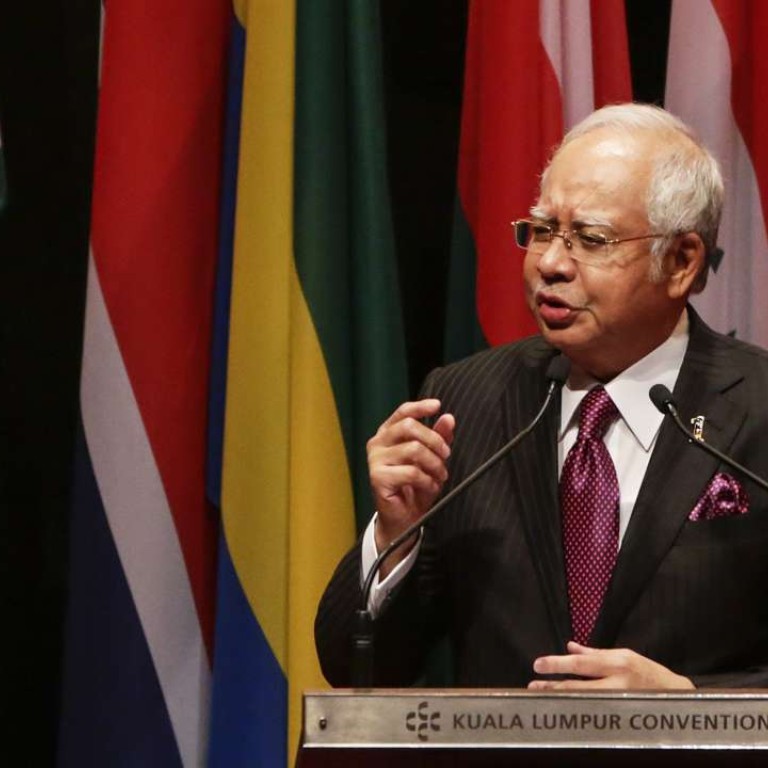
OIC urges Myanmar to halt Rohingya persecution, plans to send investigation team
World’s largest Muslim intergovernmental organisation also requested for unimpeded access for humanitarian assistance
The Organisation of Islamic Cooperation (OIC), the world’s largest Muslim intergovernmental organisation, on Thursday called on Myanmar to allow its representatives access to troubled Rakhine State for an independent investigation into claims of ethnic cleansing against the minority Rohingya Muslims.
The OIC foreign ministers held a one-day “extraordinary session” in the Malaysian capital to discuss the latest military crackdown in northern Rakhine state that has displaced tens of thousands of Rohingya.
“They [the Myanmar government] cannot ignore the voice of 1.6 billion people,” Malaysian Foreign Minister Anifah Aman told a press conference at the end of the meeting, referring to the total population of the OIC’s 57 member states.
In their adopted resolution, the ministers asked OIC Secretary General Yousef al-Othaimeen to “engage and coordinate with the Myanmar government for a high-level delegation from the OIC Contact Group to visit Rakhine state” and meet with local officials and affected Rohingya.

The proposal came on the heels of similar one from the Association of Southeast Asian Nations made last month during a special meeting of Asean foreign ministers in Naypyidaw, Myanmar’s capital, held specifically to discuss the issue.
I believe I speak for all neighbouring countries when I say that we want to avoid a repeat of the 2015 ‘boat people’ crisis ... The Rohingyas have become easy targets for human-trafficking networks
Asean had suggested sending an “eminent persons group” to verify the situation on the ground in Rakhine.
“We are saying in order to ascertain the reality of it, why not you receive an independent team to assess whether what has been said, really happened or is it just a mere propaganda. So in actual fact, it is good for them. But I don’t understand why they refuse,” Anifah said, referring to the Asean team.
The OIC, he said, is also urging Myanmar to allow unimpeded access for humanitarian assistance for the Rohingya in Rakhine.
The OIC will also work with the United Nations and Asean to develop and implement interfaith dialogues in the predominantly Buddhist country, according to the resolution.
In his speech to open the OIC meeting, Malaysian Prime Minister Najib Razak warned that, if the conflict is not resolved, Southeast Asia will not only see an influx of refugees, but it also create a new front for terror groups such as Islamic State to exploit and infiltrate.
“I believe I speak for all neighbouring countries when I say that we want to avoid a repeat of the 2015 ‘boat people’ crisis,” he said, referring to the time when thousands of Rohingya fled their homeland in Myanmar’s northern Rakhine state in boats for Malaysia, Indonesia and Thailand.
“The Rohingyas have become easy targets for human-trafficking networks. In many cases, they are held for weeks while smugglers extort more money from families back home. During their perilous journeys, they risk abuse by smugglers, and worse, death by drowning,” he said.

Najib said Malaysia will contribute 10 million ringgit (US$2.25 million) to building infrastructure such as schools and hospitals in Rakhine.
“Today, we have a new struggle that we must all come together to support – for the Rohingyas, and for an end to the pain, deprivation and death they have suffered for too long,” he said.
Malaysia is home to about 56,000 Rohingya refugees.
In 2015, Malaysian authorities discovered more than a hundred graves in what the media called “death camps” set up by traffickers to keep their human cargo in remote hills bordering southern Thailand. Similar camps and graves were also discovered by the Thai authorities on their side of the border.
“OIC member states are well aware that terrorist organisations such as Daesh could seek to take advantage of this situation,” Najib said, using another name for the Islamic State group.
“This should concern the international community as a whole, as the threat of a new home for terrorist groups has the potential to cause death and destruction well beyond this region,” he said.

Najib further raised Naypyidaw’s consternation when he led a huge rally in December, attended by thousands of Malaysian Muslims and Rohingya refugees, to protest against what he called the “genocide” of ethnic Rohingya by the predominantly Buddhist regime.
Myanmar has slammed Malaysia for interfering in its internal affairs. In her capacity as foreign minister, leader Aung San Suu Kyi refused to meet with her Malaysian counterpart Anifah Aman last year to discuss the Rohingya issue.
The Rohingya make up around one million of Myanmar’s 50 million population. The government does not regard them as one of the country’s 135 official ethnic groups and thus they are denied citizenship.
Instead the Bengali-speaking Rohingya are considered immigrants from neighboring Bangladesh.
The extraordinary meeting of the OIC foreign ministers was mooted by Malaysia.
Al-Othaimeen said that, since the latest military crackdown last October, the grouping has received reports of “extrajudicial killings, burning of houses and arbitrary arrests by security forces”, reports that were accompanied by “disturbing snapshots of death and destruction”.
He quoted a report from the UN Office of Coordination for Humanitarian Affairs claiming that between October 9, 2016, and Jan. 5, 2017, over 65,000 Rohingya fled to Bangladesh.
“The defence of Muslim minorities being targeted in this manner is a charter obligation upon all OIC member states,” he said.

